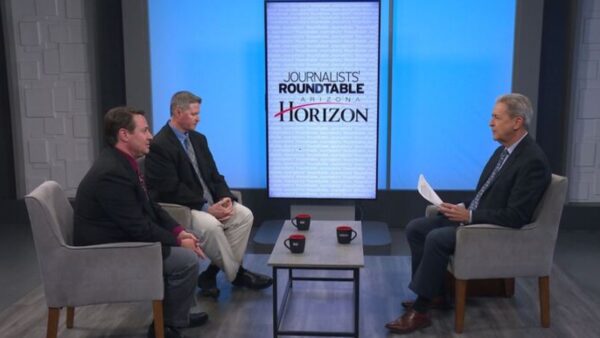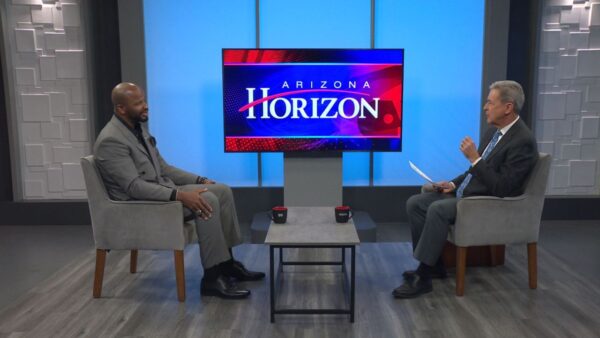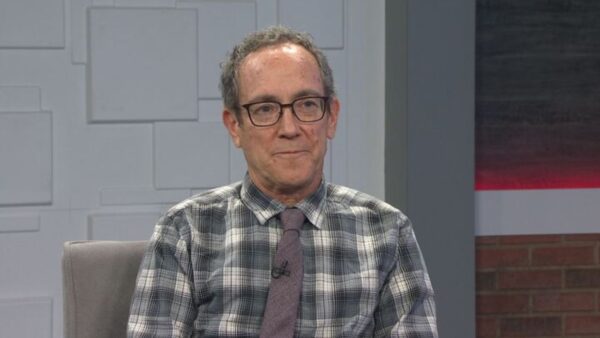The Democratic party in Arizona lost registered voters in the latest report, and the Republican party lost even more. More and more Arizonans are registering as independents. Cronkite-Eight Poll Director Dr. Bruce Merrill analyzes the change in Arizona’s voter registration numbers.
Ted Simons:
Thanks for joining us on "Horizon." Voter registration in Arizona is on the rise. There are more than 3.1 million registered voters in our state, about 1.1 million Republican and just over a million are Democrats. Nearly 900,000 are Independent. Since last year's general election, Democrats have registered at a faster rate than Republicans, but neither party is keeping up with Independent voters for registration. Earlier I spoke with Dr. Bruce Merrill, Director of the Cronkite/Eight poll about changing Arizona's political landscape. And Bruce, thank you so much for joining us on "Horizon."
Bruce Merrill:
Delighted to be here.
Ted Simons:
What do you make of the registration number sentence?
Bruce Merrill:
Arizona is going through the same process the whole nation is going through. People are turned off to both political parties, frankly. The big increase, both parties in Arizona are losing members. The only group increasing are independents or the other category. In five years there will be more Independents in Arizona than either Republicans or Democrats so big changes are occurring.
Ted Simons:
Let's go with each party. The G.O.P., numbers are down. Why?
Bruce Merrill:
Well, I think for a lot of reasons. Number one, we've gone through a presidential election where the Democrats have a very, very strong, very attractive candidate in Barack Obama. That had a big impact, particularly with young people all across the nation and in Arizona. The other thing that's happening in the Republican Party, two things that are very, very important is, number one, there's a big division in the Republican Party between the more conservative religious right Republicans and more moderate Republicans. That split is about as big as it's been in the last 40 years that I've been in Arizona. And the Republican Party is in danger of becoming a white, right-wing party that's kind of a very conservative party. If that happens, that's not where the nation is going. America is becoming a much more pluralistic, multicultural society. And so the Republican Party frankly is kind of out of step with what's happening.
Ted Simons:
Let's go Democrats now. Their numbers are down in Arizona, as well. Why?
Bruce Merrill:
Well, in this particular case what happened is that John McCain is from Arizona. I honestly believe -- again, this is just my own opinion -- but if the last election were held and John McCain had not been from Arizona, I think Arizona would have actually voted for the Democrats this time. A lot of it is demographic change. What happens in Arizona, you have an increasing Hispanic population that makes the population much younger. Hispanics are two to one Democratic over Republican. At the current rate, Hispanics will be 50% of Arizona's population in 25 years.
Ted Simons:
So you see this as a clear trend, as opposed to maybe fallout from the last election.
Bruce Merrill:
Absolutely. I think this simply reflects what's happening in America. America is changing as a nation. It is a very different nation than it was 25, 30, 40 years ago. And I think the thing that overrides a lot of this is simply the alienation that people have towards political parties in general. They don't think either political party is addressing the needs of the people.
Ted Simons:
With that said, could there be a third party, an independent party, a centrist pragmatic party? Could that blossom or is that just too difficult?
Bruce Merrill:
Not only difficult but almost impossible in America. We have single-member districts with plurality election. That's a winner take all system. It's almost impossible for a third political party to exist more than a single election or two. Think back to the American Independent Party with George Wallace, 22, 23% of the vote. Within a year, the Republicans moved over and took a more conservative position and kind of coaxed those people to come and vote Republican. In America we have a two-party system; the role of third parties is to bring about change in one of the other two parties. So not likely.
Ted Simons:
Is it likely, though, that the Republican Party, instead of veering further right, starts becoming more centrist? Or the Democrats, instead of becoming more centrist, start veering further left, could we not see a shift back to the Republican Party? Are you saying demographics are really more at play here?
Bruce Merrill: The demographics are at play but what you've described has tended to happen in America in the past. As the Democrats get bigger, they will end up with more factions within the party. Then they will start fighting. One of those factions tends to break off and becomes absorbed by the minority party. I think the greater danger here is that, because we communicate in mass communication and people are so turned off the partisan politics, I think the greater danger is this growing number of independents, frankly about 60% of the people in America that are registering as independents are under 25 years of age. They are either coming in as Democrats or as independents. That's going hurt the Republican Party. We know, Ted, that once a person acquires partisanship, once you become a Republican or Democrat, very little change occurs through the rest of your life. So you have these cohorts that move through the system. Right now, as the oldest cohort passes away, you're actually losing more Republicans than Democrats, because the Republicans controlled politics when they came into the system some 40 years ago.
Ted Simons:
Last question: As far as Arizona compares to neighboring states -- and we'll include California, as well, still a neighboring state -- compare and contrast.
Bruce Merrill:
Well, exactly the same process is happening in New Mexico. I'm not that up on Texas politics, but it's clearly happening in California, and across the southwest, particularly. The southwest is really developing. If you go back and look at a map, an electoral map, at the southwest particularly, say, four, five, six years ago, it is clearly changing from Republican to swing to Democrat. That's what's happening in Arizona.
Ted Simons:
All right, Dr. Bruce Merrill, always a pleasure. Thanks for joining us.
Bruce Merrill:
Good to be here, Ted.
Dr. Bruce Merrill:Director, Cronkite-Eight Poll;




















